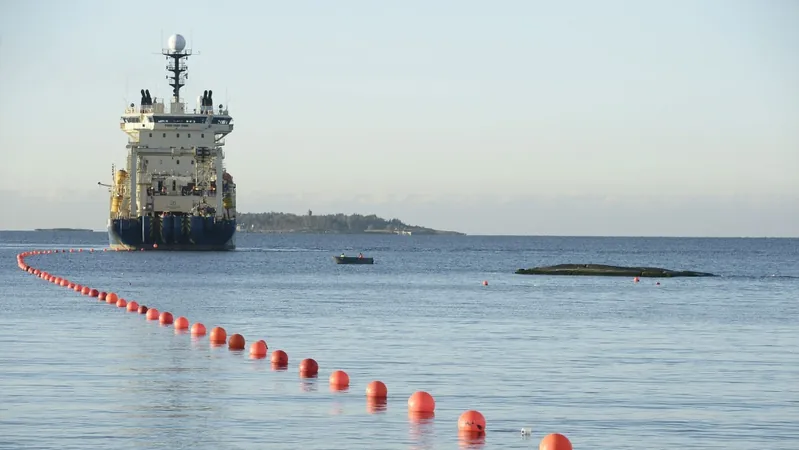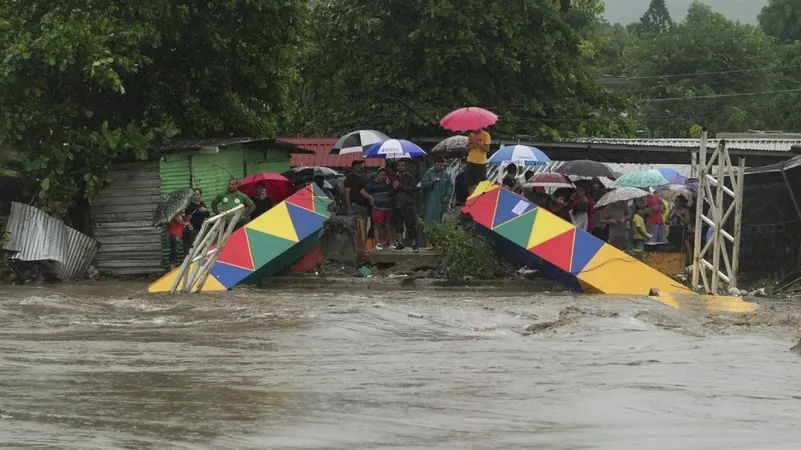
Undersea Cables in the Baltic Sea Severed: Are We Facing a Hybrid Warfare Threat?
2024-11-20
Author: Jacob
Overview
In a shocking turn of events, two critical undersea internet cables in the Baltic Sea have been disrupted, raising alarms about potential Russian interference with vital global communications infrastructure. This disruption comes amidst heightened tensions in the region, particularly following Russia's ongoing aggression in Ukraine.
Details of the Disruption
On Sunday morning at approximately 10:00 a.m. local time, a communications cable connecting Lithuania and Sweden was reported cut. Telia Lithuania, a telecommunications company, confirmed that their monitoring systems detected a significant drop in traffic, indicating physical damage rather than an equipment failure. Audrius Stasiulaitis, a spokesperson for Telia, emphasized, “We can confirm that the internet traffic disruption was not caused by equipment failure but by physical damage to the fiber optic cable.”
In addition, another cable known as the C-Lion, which links Finland and Germany, also experienced disruptions. Operated by the state-owned Finnish company Cinia, this cable is crucial as it serves as the only direct link between Finland and Central Europe, spanning nearly 1,200 kilometers (730 miles) and situated alongside critical infrastructures like gas pipelines.
Response from Finland and Sweden
These incidents have taken place as Finland and Sweden released updated survival guidance to their citizens, encompassing measures to prepare for military conflicts, potential communications blackouts, and power outages. Both nations have moved closer to NATO in recent years as a direct response to the rising threat posed by Russia.
Investigation and Analysis
An analysis indicates that the location of the disruption impacting the C-Lion cable is approximately 60 to 65 miles away from the Lithuanian-Swedish cable that was cut. The specifics of the fault in the C-Lion remain under investigation, with Cinia's CEO Ari-Jussi Knaapila hinting at the possibility of external interference.
Statement from the foreign ministers of Finland and Germany expresses “deep concern” over the severed C-Lion cable, explicitly raising the specter of “hybrid warfare.” They stated, “The fact that such an incident immediately raises suspicions of intentional damage speaks volumes about the volatility of our times. A thorough investigation is underway.” They further underscored that Europe’s security is threatened not only by direct military aggression but also by insidious tactics employed by malicious actors.
U.S. Intelligence Assessments
In the wake of these incidents, fears mount regarding the vulnerability of critical undersea infrastructure. Recent assessments from U.S. intelligence have indicated a spike in Russian military activities near key undersea cables, hinting at potential sabotage. An investigation by Nordic public broadcasters earlier this year suggested that Russia has deployed a fleet of suspected spy ships in the region, possibly targeting underwater infrastructures.
Potential Explanations
However, two U.S. officials have indicated that initial assessments reveal “no indications of nefarious activity, nor intentional damage to seafloor infrastructure,” suggesting the possibility that the disruption may have been caused by a maritime accident, such as an anchor from a passing vessel. Ship tracking data has shown at least one vessel passing close to the Lithuania-Sweden cable during the window of disruption.
Impact and Repairs
The extent of the impact from the C-Lion cable disruption is still being evaluated, but key data flows typically traverse multiple cables to prevent dependency on any single connection. Cinia has announced that a repair vessel is ready to address the fault, but the exact timeline for repairs remains uncertain, as they usually take 5 to 15 days depending on weather conditions.
Notably, the cable connecting Lithuania and Sweden had accounted for a significant portion of the country's internet capacity. According to Andrius Šemeškevičius, Telia Lithuania's chief technology officer, capacity has since been restored following the disruption.
Conclusion
As investigations continue and more information emerges, the international community remains on high alert regarding the implications of these disruptions. With growing concerns over hybrid warfare tactics, experts are urging vigilance and preparedness in the face of evolving geopolitical threats.
Stay Updated
Stay tuned for more updates and insights on this developing story!









 Brasil (PT)
Brasil (PT)
 Canada (EN)
Canada (EN)
 Chile (ES)
Chile (ES)
 España (ES)
España (ES)
 France (FR)
France (FR)
 Hong Kong (EN)
Hong Kong (EN)
 Italia (IT)
Italia (IT)
 日本 (JA)
日本 (JA)
 Magyarország (HU)
Magyarország (HU)
 Norge (NO)
Norge (NO)
 Polska (PL)
Polska (PL)
 Schweiz (DE)
Schweiz (DE)
 Singapore (EN)
Singapore (EN)
 Sverige (SV)
Sverige (SV)
 Suomi (FI)
Suomi (FI)
 Türkiye (TR)
Türkiye (TR)